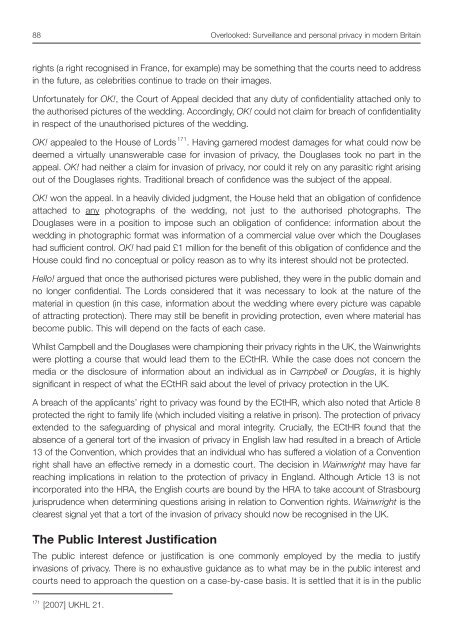Overlooked - Liberty
Overlooked - Liberty
Overlooked - Liberty
Create successful ePaper yourself
Turn your PDF publications into a flip-book with our unique Google optimized e-Paper software.
88 <strong>Overlooked</strong>: Surveillance and personal privacy in modern Britain<br />
rights (a right recognised in France, for example) may be something that the courts need to address<br />
in the future, as celebrities continue to trade on their images.<br />
Unfortunately for OK!, the Court of Appeal decided that any duty of confidentiality attached only to<br />
the authorised pictures of the wedding. Accordingly, OK! could not claim for breach of confidentiality<br />
in respect of the unauthorised pictures of the wedding.<br />
OK! appealed to the House of Lords 171 . Having garnered modest damages for what could now be<br />
deemed a virtually unanswerable case for invasion of privacy, the Douglases took no part in the<br />
appeal. OK! had neither a claim for invasion of privacy, nor could it rely on any parasitic right arising<br />
out of the Douglases rights. Traditional breach of confidence was the subject of the appeal.<br />
OK! won the appeal. In a heavily divided judgment, the House held that an obligation of confidence<br />
attached to any photographs of the wedding, not just to the authorised photographs. The<br />
Douglases were in a position to impose such an obligation of confidence: information about the<br />
wedding in photographic format was information of a commercial value over which the Douglases<br />
had sufficient control. OK! had paid £1 million for the benefit of this obligation of confidence and the<br />
House could find no conceptual or policy reason as to why its interest should not be protected.<br />
Hello! argued that once the authorised pictures were published, they were in the public domain and<br />
no longer confidential. The Lords considered that it was necessary to look at the nature of the<br />
material in question (in this case, information about the wedding where every picture was capable<br />
of attracting protection). There may still be benefit in providing protection, even where material has<br />
become public. This will depend on the facts of each case.<br />
Whilst Campbell and the Douglases were championing their privacy rights in the UK, the Wainwrights<br />
were plotting a course that would lead them to the ECtHR. While the case does not concern the<br />
media or the disclosure of information about an individual as in Campbell or Douglas, it is highly<br />
significant in respect of what the ECtHR said about the level of privacy protection in the UK.<br />
A breach of the applicants’ right to privacy was found by the ECtHR, which also noted that Article 8<br />
protected the right to family life (which included visiting a relative in prison). The protection of privacy<br />
extended to the safeguarding of physical and moral integrity. Crucially, the ECtHR found that the<br />
absence of a general tort of the invasion of privacy in English law had resulted in a breach of Article<br />
13 of the Convention, which provides that an individual who has suffered a violation of a Convention<br />
right shall have an effective remedy in a domestic court. The decision in Wainwright may have far<br />
reaching implications in relation to the protection of privacy in England. Although Article 13 is not<br />
incorporated into the HRA, the English courts are bound by the HRA to take account of Strasbourg<br />
jurisprudence when determining questions arising in relation to Convention rights. Wainwright is the<br />
clearest signal yet that a tort of the invasion of privacy should now be recognised in the UK.<br />
The Public Interest Justification<br />
The public interest defence or justification is one commonly employed by the media to justify<br />
invasions of privacy. There is no exhaustive guidance as to what may be in the public interest and<br />
courts need to approach the question on a case-by-case basis. It is settled that it is in the public<br />
171<br />
[2007] UKHL 21.















